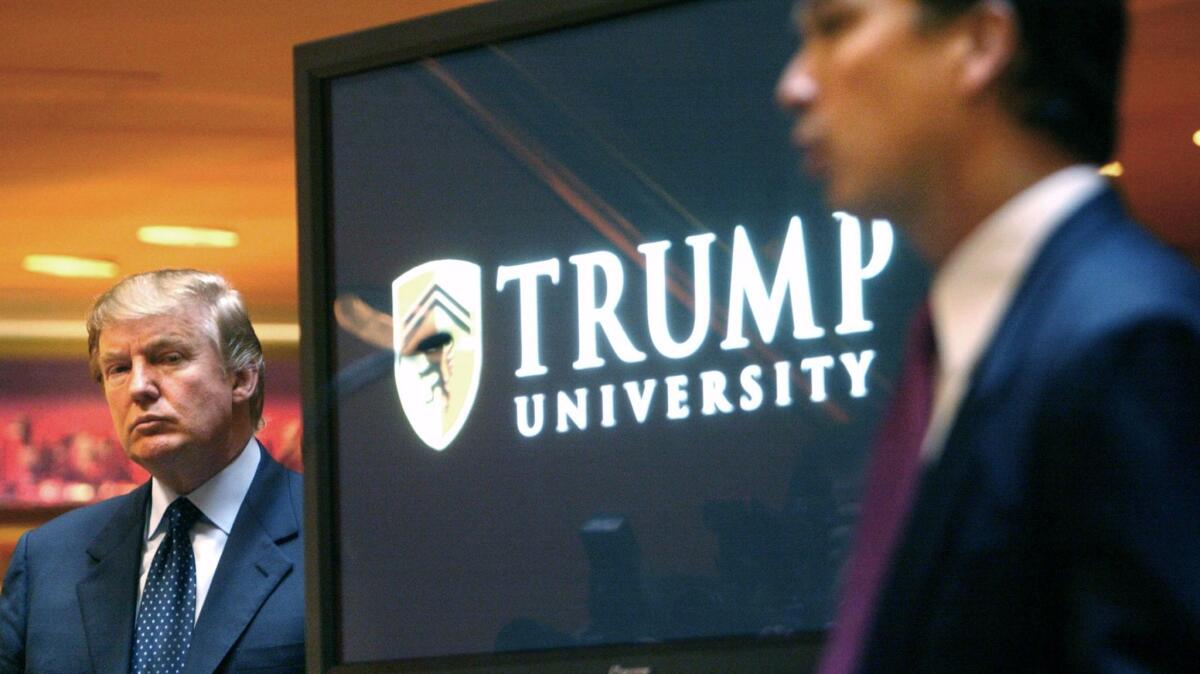Judge hears challenge to Trump University settlement

- Share via
Reporting from San Diego — The fate of a $25-million settlement that would end the Trump University litigation remained uncertain Thursday as a San Diego federal judge considered whether the objections of a Florida woman were legally valid enough to potentially upend the deal.
U.S. District Judge Gonzalo Curiel heard arguments from attorneys but declined to issue a ruling from the bench.
At the outset of the hearing, Curiel said he had no issues with the settlement and went through a checklist of factors he must consider in finalizing the deal, including the risk involved in a trial, the recovery amount, the late stage of the case, the experience of the attorneys and the reactions of litigants.
“This is a case that has been litigated, if not fiercely, zealously throughout,” Curiel said. “It’s clear on the face of the settlement agreement … it is fair, it is reasonable.”
The judge in December had given preliminary approval to the settlement, which would affect thousands of former students in two San Diego lawsuits and one filed by the New York attorney general’s office. But objections filed in March by two former students raised questions.
Sherri B. Simpson, a bankruptcy attorney who enrolled in Trump University’s $35,000 “Gold Elite” program, argued she was not given a second chance to opt out of the case once the settlement was reached and wanted to preserve her right to sue Trump individually.
And Florida resident Harold Doe, who said the money he spent on Trump University caused his family to go homeless and hungry, argued he deserved at least three times the amount he lost.
The judge spent no time on Doe’s objection, instead focusing on whether it was reasonable for Simpson to expect after reading the 2015 class-action lawsuit notice that she would have a later opportunity to leave the case should there be a settlement.
“There’s no other meaning for this paragraph,” Simpson’s lawyer, Gary Friedman, argued, referring to a parenthetical in the notice.
Patrick Coughlin, one of the plaintiffs’ attorneys, argued that when read in the right context, the paragraph signaled that participants would only be able to opt out of receiving a portion of any settlement, not leave the case entirely.
The judge seemed to agree with Coughlin. “It’s hard to see how a lay person would read that as an absolute right for an opt-out,” Curiel said.
About 7,000 students qualified to split $21 million of the settlement, but about only 3,730 class members submitted valid claim forms by the March 6 deadline, said plaintiff attorney Rachel Jensen.
In a surprise move, the New York attorney general’s office, which was promised the remaining $4 million of the settlement, has agreed to give up $1.6 million to the class members in the San Diego cases, Jensen said.
With that boost in money, attorneys predict the students will end up receiving at least 90 cents on the dollar of what they spent on Trump University. The amount is not exact because claim forms were still being processed and validated.
The lawsuits claimed Trump University mislead students into spending thousands of dollars on real estate seminars and a yearlong mentorship program that didn’t live up to promises. Students were falsely told that instructors and mentors were “handpicked” by Trump and led to believe the program was an accredited university, according to the lawsuits.
Until the very end, Trump had shut down any possibility of settling, at one point telling supporters at a May 2016 rally that the presidency wouldn’t stop him from fighting: “I could have settled this case numerous times, but I don’t want to settle cases when we’re right. I don’t believe in it. And when you start settling cases, you know what happens? Everybody sues you because you get known as a settler. One thing about me, I am not known as a settler.”
He blamed the students’ failure to succeed on their own shortcomings and the downturn of the real estate market. He pointed to a 98% approval rating on student feedback forms.
Trump at one point made an issue out of Curiel’s “Mexican heritage,” saying in interviews that the judge was biased against him because of Trump’s stance on cracking down on illegal immigration. Curiel was raised by Mexican immigrant parents in Indiana and, before becoming a judge, worked as a federal prosecutor targeting Mexican drug cartels.
Days after Trump won the White House, and just as the first of the cases was set to go to trial in San Diego, the two sides reached the settlement. Trump later said on Twitter that he needed to focus his attention on transitioning to office.
Davis writes for the San Diego Union-Tribune.
kristina.davis@sduniontribune.com
ALSO
At least one dead in North Hollywood motorcycle collision
Orange County jailhouse informant program went on for decades, mass shooter’s lawyer claims
UPDATES:
8:45 p.m.: The story was updated with comments from the judge and details from the hearing.
3:10 p.m.: The story was updated with details from Thursday’s court hearing.
The story was originally published at 12:30 p.m.
More to Read
Sign up for Essential California
The most important California stories and recommendations in your inbox every morning.
You may occasionally receive promotional content from the Los Angeles Times.













